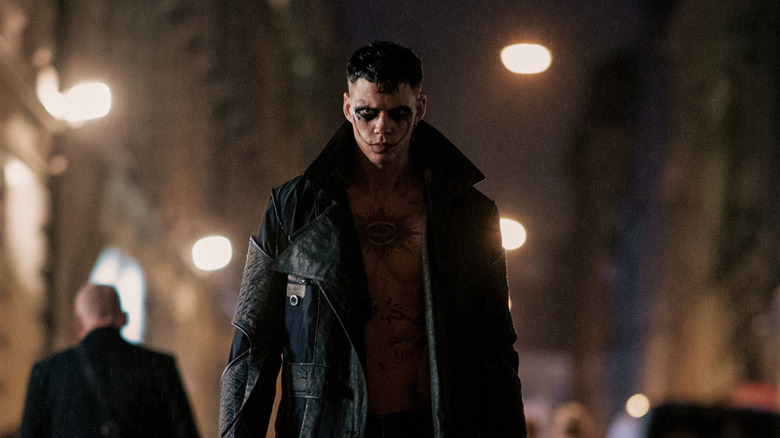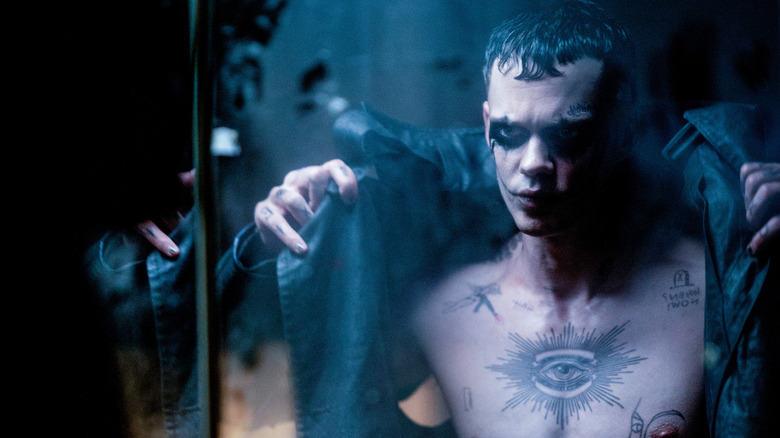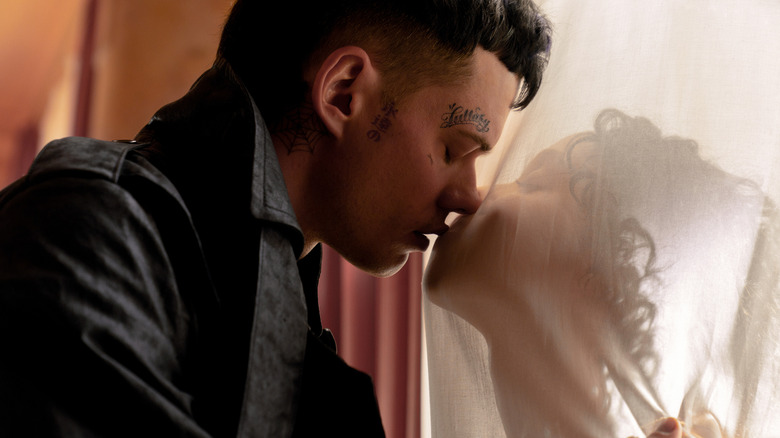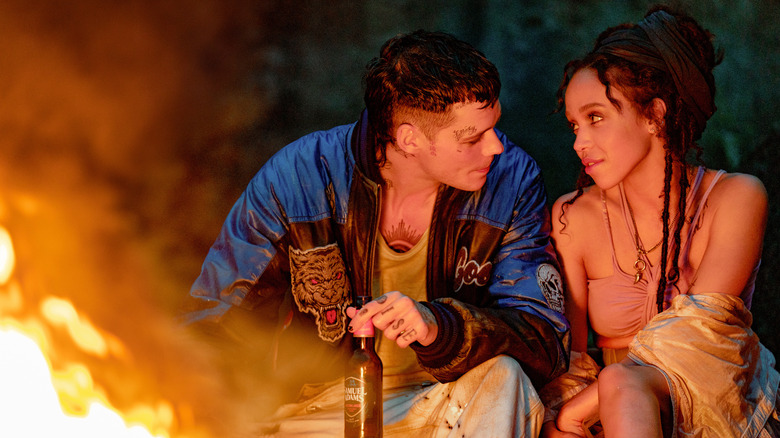The Crow Reboot's Bizarre Villain Twist Is The Nail In Its Coffin
It took more than a decade for the latest reboot of "The Crow" to rise from the grave of development hell, and throughout that long, arduous time in limbo, many names came and went on the creative team. Alexander Skarsgård and Jack Huston were both rumored for the starring role at different times, only for Skarsgård's brother Bill and Huston's uncle Danny to wind up in the final cast. Through it all, directors, writers, and the stars themselves emphasized that the 2024 film was not intended as a remake of the Brandon Lee cult classic. It was initially described as a fresh adaptation of the original 1989 graphic novel, but comic fans who went to the theater expecting that may have been severely disappointed.
Like many others, I came to the "Crow" franchise through Alex Proyas' original 1994 film. Some believe the property should have been left to rest in peace out of respect for Lee, who infamously died on the "Crow" set after a prop gun accident. But I was at least curious about what a new interpretation of James O'Barr's dark saga could be. Perhaps I should have known better.
2024's "The Crow" has a boy named Eric and a girl named Shelly. There are crows, murders, and facepaint of a sort. But beyond these bullet points, "The Crow" has little in common with the story of its predecessor or its source material. And it all has to do with the baffling bad guy — a demonic supervillain called Vincent Roeg who's original to the movie.
The Crow's simplicity was essential to its appeal
In O'Barr's original "Crow" comics and the 1994 film, Eric and Shelly are murdered in a random act of violence, the wrong-place-wrong-time victims of hopped-up gangbangers. The story's supernatural elements are mostly channeled through Eric himself, who's resurrected as an invincible specter by the titular, magical crow to exact vengeance on the criminals who murdered him and his beloved. O'Barr wrote the comics as a means of processing the loss of his own partner, who was killed by a drunk driver. Through this simple but substantive lens, "The Crow" becomes a commentary on the brutality of casual violence; on the idea that bad luck is all that separates tragedy from a fairy tale ending.
Over the years, "The Crow" has become far more famous for its aesthetics than for its message — aesthetics that influenced a whole generation of goth and goth-adjacent subcultures. The world of "The Crow" is filled with crosses and crucifixion facsimiles. It's a place where Hell has a capital H and evil is a real, tangible thing that must be punished. For all these reasons, changing the original story to accommodate a supernatural villain might not sound like it would be the end of the world. But Vincent Roeg is so confusing, half-baked, and poorly conceived that the core of the movie falls right out from under him.
Vincent Roeg is at the heart of what's wrong with The Crow
The plot of the new "Crow" movie goes something like this: Eric (Bill Skarsgård) and Shelly (FKA Twigs) meet in rehab and escape together because Shelly is being chased by agents of a demonic corporate kingpin named Vincent Roeg (Danny Huston). She formerly attended parties the villain hosted, where he once used his dark mind-control magic to make her kill an innocent woman. Roeg made a deal with the devil to live forever in exchange for sending "innocent" souls to Hell in his place. Eric and Shelly are killed by Roeg's goons, and Eric is resurrected by a mystical figure referred to in the credits as Kronos (Sami Bouajila), who promises to bring Shelly back to life if Eric can kill the villain and restore balance.
It's a big shift in lore from the source material, and it begs a ton of questions. If Roeg has been killing innocents for so long, why hasn't Kronos sent any of the other victims back to kill him? Why is Shelly in Hell while Eric wanders in his bizarre CGI purgatory? What exactly does Roeg do, and what's his obsession with piano prodigies, which vanishes midway through the movie?
The problem with introducing too much lore to a story driven by symbolism is that it distorts the metaphor and leaves you wondering too much. Ravens, crows, love, vengeance — these aren't high-concept symbols or fantastical themes. But 2024's "The Crow" frequently feels like an early-2000s comic book movie, from the distortion-laden opening credits sequence to the vague, magical villain with his stupid name on the side of a skyscraper.
The Crow is confused about its own magic and morality
During the climax, Roeg tries to spin Eric's violent vengeance back around on him. Would Shelly even love him anymore after all the people he's killed? By changing the villain from a random gangster to a literal harbinger of evil, you'd think that this version of "The Crow" was trying to make some grand statement. Kronos says that Roeg's immortality is a distortion of the natural balance, but that idea is never brought up again.
Even the rules of the afterlife and resurrections — arguably the core of "Crow" mythology — are confused. Why does Shelly immediately go to Hell and Eric doesn't when they are killed by the same people in the same way? Vincent's victims all go to Hell, but they're not killed by him, they're killed by his lackeys. So maybe Shelly goes to Hell because of the murder she committed? What of the baffling flashbacks that riddle the movie and suggest that Eric killed his neglectful mother in a fire as a child? Is childhood matricide permissible, while murder under satanic mind control is punishable by eternal damnation?
Eric would have come back with Shelly, we're told, had he not wavered in his love after seeing the video of the murder she committed. Of course, we never learn who the woman she killed was, nor does Eric take her place in Hell, as Kronos says he must. "The Crow" can't be bothered to remember its own trumped-up magic rules when all is said and done, so why should I waste my time trying to understand them for myself? While the lead performances are fine and it's definitely better than that "Crow" TV show nobody likes to talk about, this still feels like a big miss.



